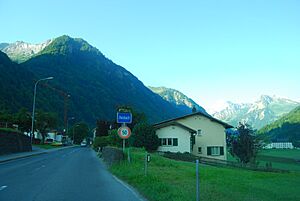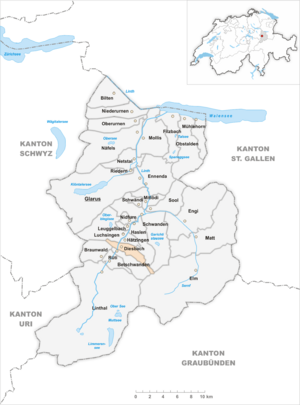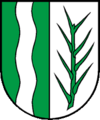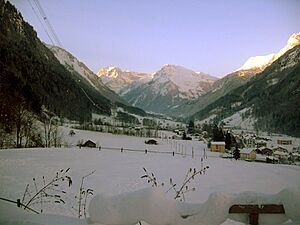Diesbach, Glarus facts for kids
Quick facts for kids
Diesbach
|
||
|---|---|---|
|
Village (and former municipality)
|
||
 |
||
|
||

The former municipal area (2003)
|
||
| Country | Switzerland | |
| Canton | Glarus | |
| Municipality | Glarus Süd | |
| Elevation | 604 m (1,982 ft) | |
Diesbach is a charming village located in Switzerland. It is part of the larger municipality of Glarus Süd in the beautiful canton of Glarus. It's a quiet place nestled in a scenic valley.
Contents
A Look Back in Time
Diesbach was first mentioned in official records way back in 1350. It was known simply as Diesbach then.
For a long time, Diesbach was its own small municipality. But in 2004, it joined with the nearby municipality of Luchsingen. Later, on January 1, 2011, Luchsingen itself became part of the much larger new municipality called Glarus Süd.
Where Diesbach Is Located
Diesbach is found in the valley of the Linth river. The village sits on the east side of the river. It's about 604 meters (1,982 feet) above sea level.
To the south of Diesbach is the village of Betschwanden. To the north, you'll find Hätzingen. Above the village, to the southeast, stands the impressive Kärpf mountain. It reaches a height of 2,794 meters (9,167 feet).
Getting Around Diesbach
Diesbach is easy to reach by road and train. The main road, called Hauptstrasse 17, goes right through the village. This road travels all the way through the canton of Glarus. It then climbs up the Klausen Pass into the canton of Uri.
A railway line also runs alongside the main road and the Linth river. This is the Weesen to Linthal railway line. The high mountain Klausen Pass is usually only open from June to September. For the rest of the year, the road and railway are the only ways to get to Diesbach.
The village has its own train stop, called Diesbach-Betschwanden railway station. You can catch the Zürich S-Bahn service S25 here. This train runs hourly between Linthal and Zurich.
How Many People Live Here?
The number of people living in Diesbach has changed over the years. Here's a look at the historical population:
| Year | Population |
|---|---|
| 1837 | 466 |
| 1850 | 419 |
| 1900 | 461 |
| 1950 | 476 |
| 2000 | 237 |
 | Claudette Colvin |
 | Myrlie Evers-Williams |
 | Alberta Odell Jones |



